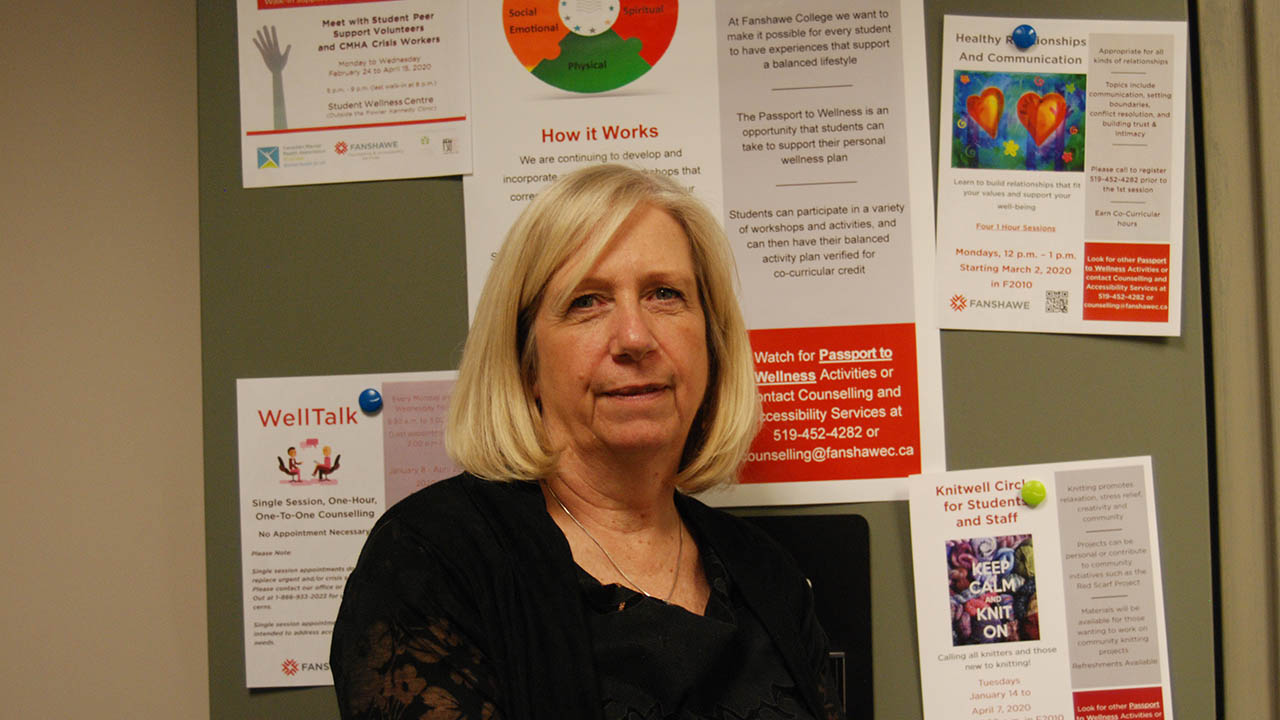Province launches new mental health strategy
 CREDIT: EMILY STEWART
CREDIT: EMILY STEWARTSuzanne Book, director of Counselling and Accessibility Services at Fanshawe College, has worked in the student mental health sector for many years and is pleased to see the Ontario government tackling mental health and addictions.
The Ontario Government has launched their Roadmap to Wellness: A Plan to Build Ontario’s Mental Health and Addictions Systems.
A press release from the provincial government announced that $3.8 billion over the next decade will expand existing programs and create new initiatives under their mental health and addictions plan. A streamlined TeleHealth phone number and a cognitive behavioural therapy program (CBT) are part of the initiative.
The new program Mindability, a $20 million investment, will be launched in spring 2020 with more expansion in the fall. Mindability will provide CBT to Ontarians who are 10-years-old and older at no outof- pocket cost to eligible patients. Personal workbooks, clinical counselling, group and individual therapy, telephone coaching and webbased programing will be included in the program.
“It’s great to see that the government is certainly acknowledging that need, that we have quite high increases and needs for mental health that have been unmet,” said Suzanne Book, Fanshawe College’s director of Counselling and Accessibility Services.
Book added that since community agencies and health care providers are stretched beyond their abilities to accommodate certain mental health issues, there’s been more demand than service, so the investment will be beneficial.
Previously, learning disabilities (LDs) were the top reason why college students in Ontario would turn to on-campus counselling services. Now, mental health is the number one reason.
Fanshawe’s Counselling and Accessibility Services provides several mental health resources for students. Between 10 to 12 half-hour, same day appointments are available every day for students who urgently need to talk to someone.
The Student Wellness Centre has single-session walk-in appointments available on Mondays and Wednesdays. The WellTrack app and Good2Talk phone line are also available to Fanshawe students.
Counselling and Accessibility also partners with the Canadian Mental Health Association (CMHA) for five weeks each semester to provide after-hours services. Students may also be referred to CMHA, Family Service Thames Valley, or Daya Counselling. The College also works with Youth Opportunities Unlimited (YOU).
Fanshawe’s Counselling and Accessibility and regional hospitals work closely together if a student has been sent to hospital for a mental health crisis. From there, they will determine the situation and what medications they’ll need, if necessary. If a student experiences psychosis symptoms but hasn’t been diagnosed, the hospitals’ regional psychosis program and Counselling and Accessibility will examine what is happening.
“If for example, you don’t eat for four days and you haven’t slept and you’ve been pulling all-nighters, then things can happen that maybe you start seeing something or hearing something,” Book said. “So is it because you haven’t eaten and slept and that’s your body’s normal reaction to not having those resources, or is it the beginning of something else being triggered in terms of the mental health issues?”
Ontario’s new Mindability program will give students another option to help their mental health.
“I think that’s important because people are more likely to do well if they’ve had made the choice themselves about ‘What’s the fit for me right now?’” Book said.
She said it would be interesting to see if Counselling and Accessibility would be affected by the investment, but the on-campus services likely won’t be eliminated. Year after year, Counselling and Accessibility see an increase of students coming in to address more serious and complex issues.
Book said there are several reasons for the intake increase, including a reduced stigma on mental health. When she was working in the elementary and secondary school systems, she noticed that students were diagnosed with issues like anxiety and eating disorders at a younger age.
She added some research also found young people feel like they live in a less hopeful world than in the past and while some are stepping up for change, others may feel like the global issues are too big to tackle. The amount of time spent on the internet is another factor, because talk therapy can be an engaging way to address concerns in a way that doesn’t come through texting. Book said that reminding people to talk to each other online and especially through face-to-face conversations is important.
“There’s obviously lots of gifts about online — information seeking and connecting and lots of positives — but there are some things to be aware of in terms of not to forget about the importance of that personal interaction that actually does just make us feel better,” she said.
Fanshawe’s Counselling and Accessibility is located in room F2010.














